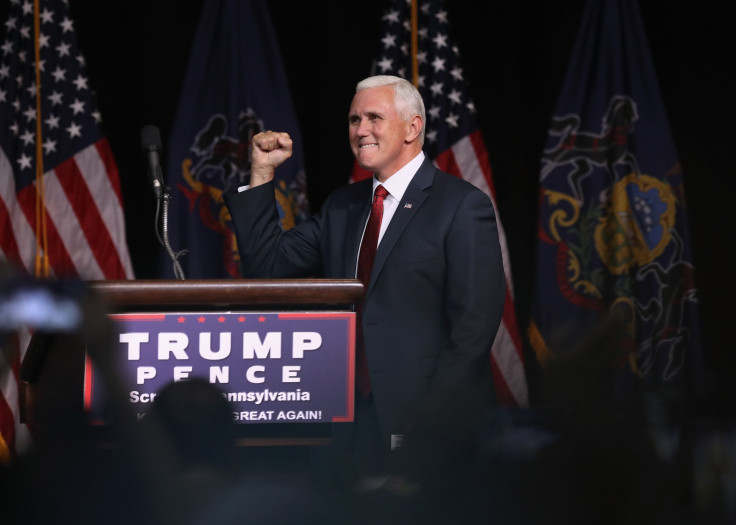Mike Pence Endorses Paul Ryan: 5 Times The VP Candidate Contradicted Donald Trump

A running mate is meant to shore up or expand support for the name at the top of the ticket. In other words, a candidate and his or her running mate are supposed to be on the same page. But Indiana Gov. Mike Pence, the vice presidential pick of GOP presidential nominee Donald Trump, sometimes seems like he is running an entirely different campaign.
Mike Pence "strongly" endorsed House Speaker Paul Ryan Wednesday, breaking rank with Trump, who has withheld his support of the Wisconsin representative.
"I strongly support Paul Ryan, strongly endorse his re-election," Pence said in a phone interview with Fox News. "He is a longtime friend. He's a strong conservative leader. I believe we need Paul Ryan in leadership in the Congress of the United States."
Ryan is currently fighting in a competitive primary race against challenger Paul Nehlen, which will come to a vote July 9. But Trump, perhaps in retaliation for Ryan's rebukes of some of the nominee's recent controversial statements, told the Washington Post that he was "not quite there yet" in response to a question about his support for the House Speaker. The quote itself seemingly doubles as a play on words and a reference to Ryan's previous reluctance to endorse Trump for President.
Trump's refusal to endorse Ryan has angered many GOP leaders, including RNC chairman Reince Priebus. Pence's endorsement can be seen as an olive branch to the Republican establishment, putting himself yet again in the role of clean-up man for Trump's controversial and bombastic positions.
Here are 5 more times Mike Pence contradicted Trump in their still-new partnership:
1. Russia
When news broke that Russian intelligence agencies were suspected in the hack of the Democratic National Committee that revealed party favoritism of Hillary Clinton over Bernie Sanders, Trump made an unorthodox move. The GOP nominee insinuated that Russia should also try to find Clinton's missing State Department emails, which have been the focus of much scrutiny from the right.
Pence, on the other hand, responded more conventionally.
"If it is Russia and they are interfering in our elections, I can assure you both parties and the United States government will ensure there are serious consequences," Pence said in a press conference at almost the exact time of Trump's arguably treasonous comments.
2. NATO
Throughout his campaign, Donald Trump has repeatedly claimed that if he were President, he would be willing to pull out of NATO if member countries did not start contributing more to the military alliance group financially. He has suggested that the United States carries an unfair burden in the alliance.
However, many foreign policy experts, even those who agree with Trump that the United States is exploited financially in the alliance, believe that a willingness to back out on NATO commitments would be disastrous.
Pence seemed to contradict Trump on this issue, assuring voters that the United States would "absolutely" defend its NATO allies if attacked.
"We'll uphold our treaty obligations, including the mutual defense agreement that is NATO," Pence told the PBS NewsHour earlier this month.
3. Khizr Khan
Since the final night of the 2016 Democratic National Convention, Donald Trump has been engaged in a media feud with Khizr Khan, a Muslim-American lawyer whose son, Humayun Khan, was killed in the Iraq War in 2004. Khan accused Trump of disparaging Muslim-Americans and questioned if he had sacrificed for the country or read the U.S. Constitution. Instead of taking a more sympathetic stance to the Gold Star family, as most politicians would have done, Trump has continued to fire back at the Khan family, accusing them of courting media attention.
Pence took an objectively softer stance.
“Donald Trump and I believe that Captain Humayun Khan is an American hero and his family, like all Gold Star families, should be cherished by every American," Pence said, according to Politico.
4. Muslim Ban
One of the cornerstones of Trump's campaign has been his suggestion that the United States should temporarily ban Muslims from entering the country until the government can more properly address the threat of terrorism. Many people on both sides of the aisle have rebuked the proposal, noting that it probably constitutes a First Amendment violation. One of those people was Pence, who tweeted his disapproval of the ban before being selected as Trump's running mate.
Calls to ban Muslims from entering the U.S. are offensive and unconstitutional.
— Governor Mike Pence (@GovPenceIN) December 8, 2015
5. Name Calling
Donald Trump has introduced a new level of public discourse into presidential elections. From remarks about the size of his, ahem, manhood, to his perpetuation of conspiracy theories, like one that Texas Sen. Ted Cruz's father played a role in the Kennedy assassination, Trump has set a new bar. One of the hallmarks of his politically incorrect candidacy has been name-calling. He has attempted to brand opponents like Cruz and Clinton as "Lyin' Ted" and "Crooked Hillary," while calling others "stupid," "low energy" or "a disgrace."
Yet, when President Obama referred to Donald Trump as a "homegrown demagogue" at the DNC, Pence responded the next day in a radio interview calling Obama's remarks unbefitting of his office.
"I don’t think name-calling has any place in public life," Pence said. "I thought that was unfortunate that the president of the United States would use a term like that."
Pence did not seem to see the irony in the statement.
© Copyright IBTimes 2024. All rights reserved.






















